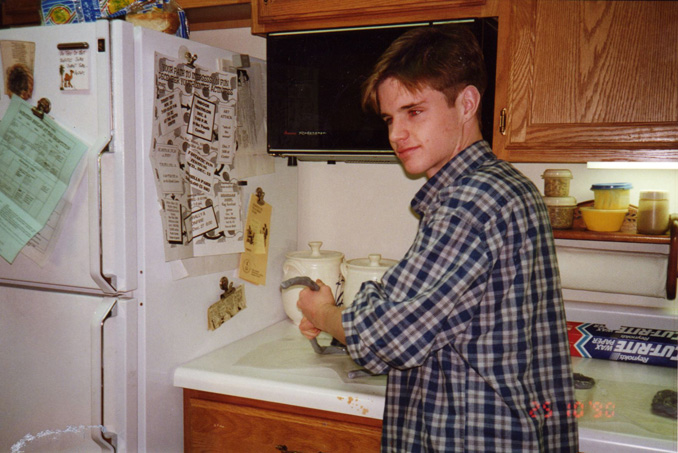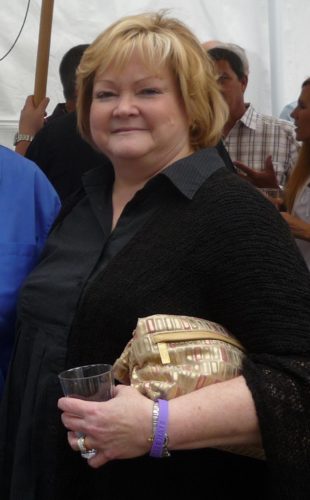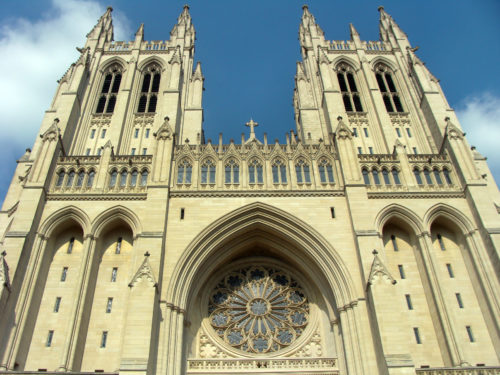Pagan Perspectives
I had always been wary of strangers. Every gay child growing up in the 1970’s learned this important life skill. American culture was, and in many ways remains, openly antagonistic toward our kind; it made sure that we knew our place. I grew up hearing stories, often in hushed tones, about men who had been discovered to be limp-wristed fairies, and who were subsequently shunned, fired from their jobs, and forced to move away to start new lives as outcasts.
But living near San Francisco meant that I had a certain level of protection from the harsh realities of a homophobic world, as this was the place many of those outcasts would journey in their search for acceptance. Life in the Bay Area was not idyllic for a queer person, as many erroneously assume. I was bullied, threatened, taunted, ridiculed, denied jobs, passed over for promotions, and even physically attacked for being gay. In spite of this I could also see how acceptance of different types of people and lifestyles was gradually increasing, and that these incidents were not indicative of everyday life. I knew that I had it better in the Bay Area than many others did elsewhere. As I got older, I became cautious in public so as to not draw unwanted attention to myself from potentially violent straight males, but I never once felt threatened in those spaces that were queer-specific, such as our local gay bar, where friends would gather to be ourselves and hopefully make connections along the way.
In October of 1998 that all changed.

Matthew Shepard [Matthew Shepard Foundation].
Both men were quickly arrested and found guilty, and they are now serving two consecutive-life sentences without the possibility of parole.
This brutal attack shocked the nation. Matthew certainly wasn’t the first gay man to have been beaten to death for simply being who he was. Our history is soaked in the blood of queer people who died at the hands of bigoted and small-minded men, fed by a deadly culture of toxic masculinity and fear. But the time was right for a shift in the collective consciousness.
Matthew Shepard was young and beautiful. He had the face of an angel. To a great deal of white America, he looked like he could have been anybody’s son; his murder struck a chord in those who might have otherwise continued to turn a blind eye. It was a wake-up call for the nation, and proved to be a catalyst for much legislative change in our country.
This heinous crime deeply affected me, along with every other queer person I knew. Not only did it drive home the sheer violent hatred that many in this country (and around the world) had for us, it also reminded us that we need to come together to collectively fight for our equality, or else we would surely die together.
In the wake of that tragedy, a silver lining started to emerge: queer people began to see more support from others. People began speaking out. Legislation began to be enacted. A shift was definitely felt across the country.
In the years following Matthew’s death, his mother has done much to ensure that his legacy will be one of equality and freedom. Judy Shepard has been an outspoken advocate for queer rights, and along with her husband Dennis formed the Matthew Shepard Foundation, whose mission is to “empower individuals to embrace human dignity and diversity through outreach, advocacy and resource programs.”

Judy Shepard [Wikimedia Commons].
Previously, the Shepards had been unable to find a suitable location for Matthew’s remains for fear that whatever site was chosen would be vandalized. At Matthew’s funeral, members of the Westboro Baptist Church arrived holding offensive signs and chanting derogatory names and slogans. Matthew’s death certainly inspired a lot of progressive activism, but it also emboldened those who, out of bigotry and hatred, would champion those who seek to destroy us. Matthew’s interment at the National Cathedral effectively protects his final resting place from desecration, and also symbolically elevates him in the national consciousness as he takes his place alongside other historical luminaries such as President Woodrow Wilson, Helen Keller, and Anne Sullivan, along with many diplomats, senators, and church architects. This gives the public a safe place in which to reflect on the spirit of Matthew and what he has meant for so many across the country and around the world.
In the emerging pantheon of queer spirit, Matthew Shepard takes his place as one of our sacred martyrs. In following the tradition of identifying those spirits who have reached out from the other side to affect change in this world, I can say that, from my personal experience, Matthew Shepard is a saint.

The Washington National Cathedral, where the ashes of Matthew Shepard will be interred [Wikimedia Commons].
While there is evidence to suggest this may have been the case, in my mind, this does nothing to detract from Matthew’s sainthood, especially if we keep in mind that not all saints were perfect, flawless people in life. Some were downright bad people.
According to folklorist Judika Illes, a saint is a spirit that bestows blessings (life force) from the other side, often without regard to how they may have conducted themselves in life.
In the immediate aftermath of his death and the media frenzy that ensued, while feeling powerless and filled with grief, I felt compelled to place a memorial link for him on my website which pointed to his newly created foundation. I remember I would go and see the pictures of him – so young, but not that much younger than I had been at the time – and I was filled with a deep sadness that made little sense to me. It was a tragedy, yes, but it was not as though I knew him personally. I was surprised at the depth of my grief, only a portion of which could be explained as being derived from the sense of personal danger that his death represented for all queer people living in a society that would just as soon see us dead. I somehow felt a personal connection, but dismissed it as a flight of fancy, born of fear and grief. This, however, was only the tip of the iceberg.
As part of my work at the time training in the Faery tradition of Witchcraft, I was familiar with certain techniques that involved helping souls cross over. While it was not my conscious intention to involve Matthew in this work -because who the hell am I to presume anything about this person whom I had never met! – I had an extraordinary experience in which his spirit spontaneously came to me and expressed a sense of gratitude and blessing.
I was floored, not having intended to reach out to him, but I was also filled with a sense of tremendous peace, and also a feeling of being blessed with power. Though he had died in anguish, fear, and pain, I felt this his spirit was not only healed, but was offering healing to the whole world. He now stood as a shining beacon of hope and compassion for our many queer sisters, brothers, and sacred others. From that moment onward, Matthew Shepard has been part of my pantheon of queer spirits, and I consider him to be one of the queer Mighty Dead.
May he rise in power, and may we all be touched by his love, compassion, and blessings.
St. Matthew Shepard
Feast Day: Dec. 1 (his birthday)
Martyred shepherd to our flock
An angel born of fear and pain
The time you spent on earth was short
Though now through love you do remain.
Heaven sent you here to us
Every tear that’s shed shall now
Wash us clean and heal our hearts.
So, let this be our sacred vow.
Many tears have fallen in the writing of this column. May they be a spell to help heal what still needs healing.
* * *
The views and opinions expressed by our diverse panel of columnists and guest writers represent the many diverging perspectives held within the global Pagan, Heathen and polytheist communities, but do not necessarily reflect the views of The Wild Hunt Inc. or its management.
The Wild Hunt is not responsible for links to external content.
To join a conversation on this post:
Visit our The Wild Hunt subreddit! Point your favorite browser to https://www.reddit.com/r/The_Wild_Hunt_News/, then click “JOIN”. Make sure to click the bell, too, to be notified of new articles posted to our subreddit.
